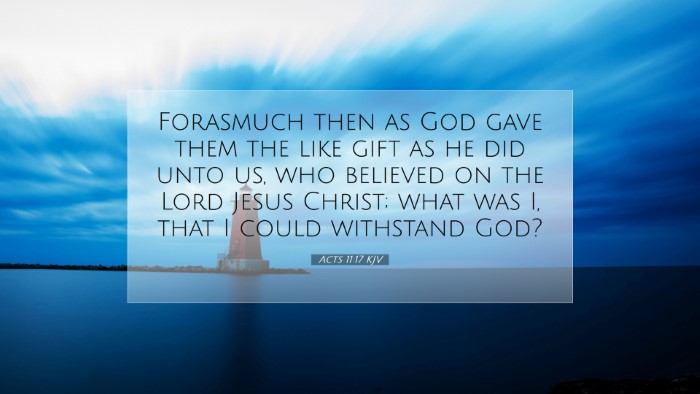Commentary on Acts 11:17
Verse: Acts 11:17 states, "If then God gave them the same gift as he gave us, who believed in the Lord Jesus Christ, who was I that I could stand in God’s way?"
Introduction
This verse captures a pivotal moment in the early Church as it confronts the radical inclusion of Gentiles into what was largely regarded as a Jewish faith. The verse is essential for understanding the theological implications of the Church moving towards a more universal mission. The insights drawn from public domain commentaries by Matthew Henry, Albert Barnes, and Adam Clarke shed light on the complexity and significance of this passage.
Contextual Background
Before diving into the commentary, it is crucial to examine the surrounding events. Acts 10 narrates Peter’s vision, the visit from Cornelius, and the subsequent outpouring of the Holy Spirit upon the Gentiles. These events set the stage for the discussion in Acts 11 where Peter defends the inclusion of the Gentiles to the Jewish believers.
Verse Analysis
Matthew Henry: Henry emphasizes the weight of divine gifting and providence. He points out that Peter acknowledges the sovereign act of God in granting the Holy Spirit to the Gentiles. Henry articulates that Peter's question, "Who was I that I could stand in God’s way?" demonstrates not only humility but also an understanding of God’s sovereign will. It serves as a reminder to believers to not obstruct what God is doing.
Albert Barnes: Barnes provides a detailed examination of the phrase, "the same gift as he gave us." He suggests that there is a significant theological point in recognizing that the Holy Spirit’s gift is not confined by human barriers. He explicates that Peter's realization signifies a groundbreaking shift, where faith in Jesus Christ is the unifying factor rather than cultural or ethnic backgrounds. Barnes emphasizes that this passage is foundational for the doctrine of grace that transcends human constructs.
Adam Clarke: Clarke's commentary delves into Peter's assertion with a theological lens. He reinforces the concept of God's impartiality and the equality of all believers before God. Clarke discusses how Peter’s argument is not only personal but collective, urging us to recognize that God's gift is freely given without discrimination. He highlights that the Church must adjust its understanding of community to align with God’s inclusive vision.
Theological Implications
This verse has profound theological implications that resonate through centuries. Here are key insights regarding their implications:
- Divine Sovereignty and Human Responsibility: The acknowledgment that God gives His gifts according to His will suggests a divine sovereignty that believers should not resist. It invites a deeper contemplation of how human agency interacts with God's plan.
- Unity in Diversity: Peter’s realization fosters a theology that celebrates diversity within unity. The inclusion of Gentiles serves as a precursor to the universal call of the Gospel, urging the Church to move beyond cultural barriers.
- Transformation of Identity: The event represents a transformative moment in understanding identity in Christ. It raises questions about how various identities are reconciled within the body of Christ, emphasizing a shared faith over cultural identity.
Practical Applications
The insights from scholarly commentary on this verse offer actionable takeaways for pastors and students alike:
- Embrace Inclusivity: Churches today must strive to welcome all individuals, reflecting the inclusiveness modeled by Peter's realization. This requires reevaluating structures or norms that may exclude others.
- Celebrate the Gifts of Others: Just as God bestows gifts upon all believers, congregations should encourage diverse expressions of faith, recognizing that different backgrounds can enrich communal worship.
- Teach Grace and Forgiveness: Pastors should focus on grace as a core teaching, reinforcing that God's gifts and blessings are not the result of human merit but rather divine grace. This can foster healing in congregations dealing with division.
Conclusion
Acts 11:17 encapsulates a transformative theological stance that continues to challenge the Church's understanding of community, identity, and God's gift. By reviewing the insights of Matthew Henry, Albert Barnes, and Adam Clarke, it offers deepened comprehension of God's nature as inclusive, sovereign, and gracious. For pastors, theologians, and students, this passage is a call to embody the spirit of divine inclusion in all aspects of ministry and teaching.


